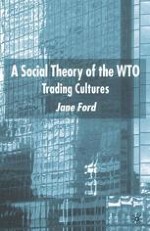2003 | OriginalPaper | Buchkapitel
Re-thinking Power in the Trading Regime
verfasst von : Jane Ford
Erschienen in: A Social Theory of the WTO
Verlag: Palgrave Macmillan UK
Enthalten in: Professional Book Archive
Aktivieren Sie unsere intelligente Suche, um passende Fachinhalte oder Patente zu finden.
Wählen Sie Textabschnitte aus um mit Künstlicher Intelligenz passenden Patente zu finden. powered by
Markieren Sie Textabschnitte, um KI-gestützt weitere passende Inhalte zu finden. powered by
Developing countries adopted cooperative policies during the Uruguay Round, eroding their traditional identities as the Other in an egoistic trading regime. In adopting disembedded liberal norms, supporting legalism and unilaterally liberalizing during the Uruguay Round, developing countries adopted a new role. In sustaining this over time, they taught this identity to developed countries through representational practices. At the same time, the developing countries learned to see themselves as reciprocal traders. This helped to establish a new collective identity in the trading regime as the boundaries between developing countries and developed countries were re-formed and both groups became part of a Self of multilateral traders. This process represented a change in the regime’s culture from limited multilateralism to deeper multilateralism or superlateralism, based on a collective interest.
